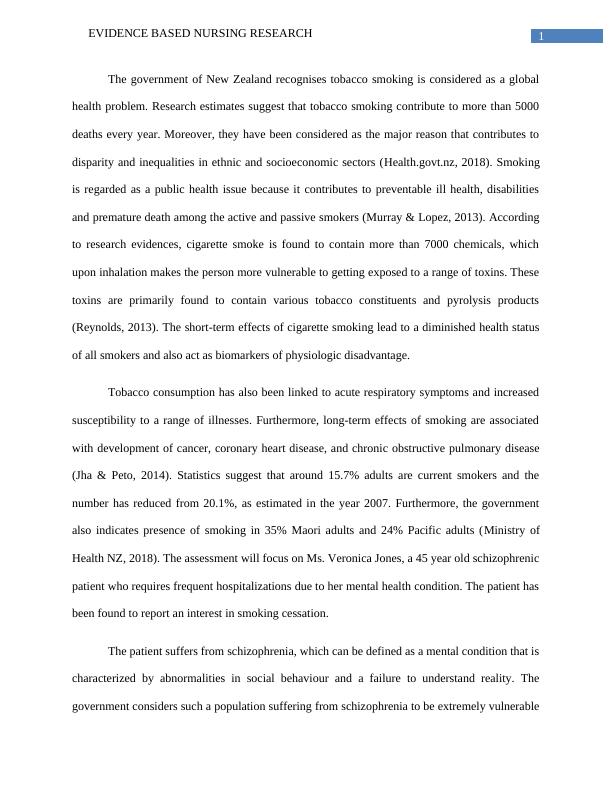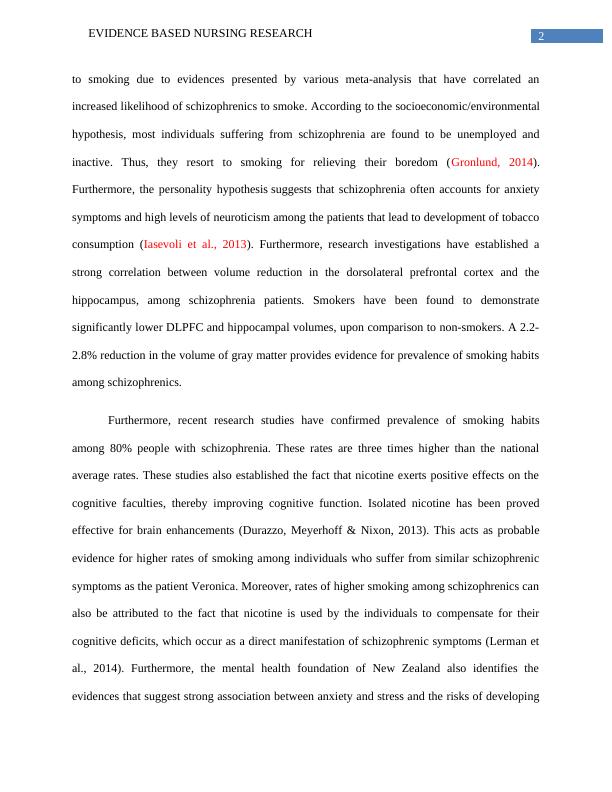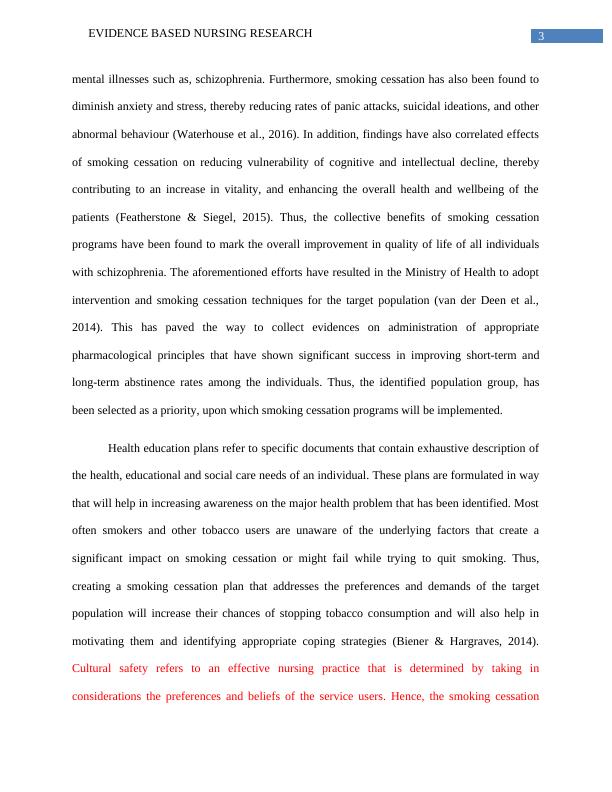Smoking Cessation Program for Schizophrenic Patients: Evidence-Based Nursing Research
Added on 2023-06-14
12 Pages3263 Words161 Views
Running head: EVIDENCE BASED NURSING RESEARCH
Summative assessment 1
Name of the Student
Name of the University
Author Note
Summative assessment 1
Name of the Student
Name of the University
Author Note

1EVIDENCE BASED NURSING RESEARCH
The government of New Zealand recognises tobacco smoking is considered as a global
health problem. Research estimates suggest that tobacco smoking contribute to more than 5000
deaths every year. Moreover, they have been considered as the major reason that contributes to
disparity and inequalities in ethnic and socioeconomic sectors (Health.govt.nz, 2018). Smoking
is regarded as a public health issue because it contributes to preventable ill health, disabilities
and premature death among the active and passive smokers (Murray & Lopez, 2013). According
to research evidences, cigarette smoke is found to contain more than 7000 chemicals, which
upon inhalation makes the person more vulnerable to getting exposed to a range of toxins. These
toxins are primarily found to contain various tobacco constituents and pyrolysis products
(Reynolds, 2013). The short-term effects of cigarette smoking lead to a diminished health status
of all smokers and also act as biomarkers of physiologic disadvantage.
Tobacco consumption has also been linked to acute respiratory symptoms and increased
susceptibility to a range of illnesses. Furthermore, long-term effects of smoking are associated
with development of cancer, coronary heart disease, and chronic obstructive pulmonary disease
(Jha & Peto, 2014). Statistics suggest that around 15.7% adults are current smokers and the
number has reduced from 20.1%, as estimated in the year 2007. Furthermore, the government
also indicates presence of smoking in 35% Maori adults and 24% Pacific adults (Ministry of
Health NZ, 2018). The assessment will focus on Ms. Veronica Jones, a 45 year old schizophrenic
patient who requires frequent hospitalizations due to her mental health condition. The patient has
been found to report an interest in smoking cessation.
The patient suffers from schizophrenia, which can be defined as a mental condition that is
characterized by abnormalities in social behaviour and a failure to understand reality. The
government considers such a population suffering from schizophrenia to be extremely vulnerable
The government of New Zealand recognises tobacco smoking is considered as a global
health problem. Research estimates suggest that tobacco smoking contribute to more than 5000
deaths every year. Moreover, they have been considered as the major reason that contributes to
disparity and inequalities in ethnic and socioeconomic sectors (Health.govt.nz, 2018). Smoking
is regarded as a public health issue because it contributes to preventable ill health, disabilities
and premature death among the active and passive smokers (Murray & Lopez, 2013). According
to research evidences, cigarette smoke is found to contain more than 7000 chemicals, which
upon inhalation makes the person more vulnerable to getting exposed to a range of toxins. These
toxins are primarily found to contain various tobacco constituents and pyrolysis products
(Reynolds, 2013). The short-term effects of cigarette smoking lead to a diminished health status
of all smokers and also act as biomarkers of physiologic disadvantage.
Tobacco consumption has also been linked to acute respiratory symptoms and increased
susceptibility to a range of illnesses. Furthermore, long-term effects of smoking are associated
with development of cancer, coronary heart disease, and chronic obstructive pulmonary disease
(Jha & Peto, 2014). Statistics suggest that around 15.7% adults are current smokers and the
number has reduced from 20.1%, as estimated in the year 2007. Furthermore, the government
also indicates presence of smoking in 35% Maori adults and 24% Pacific adults (Ministry of
Health NZ, 2018). The assessment will focus on Ms. Veronica Jones, a 45 year old schizophrenic
patient who requires frequent hospitalizations due to her mental health condition. The patient has
been found to report an interest in smoking cessation.
The patient suffers from schizophrenia, which can be defined as a mental condition that is
characterized by abnormalities in social behaviour and a failure to understand reality. The
government considers such a population suffering from schizophrenia to be extremely vulnerable

2EVIDENCE BASED NURSING RESEARCH
to smoking due to evidences presented by various meta-analysis that have correlated an
increased likelihood of schizophrenics to smoke. According to the socioeconomic/environmental
hypothesis, most individuals suffering from schizophrenia are found to be unemployed and
inactive. Thus, they resort to smoking for relieving their boredom (Gronlund, 2014).
Furthermore, the personality hypothesis suggests that schizophrenia often accounts for anxiety
symptoms and high levels of neuroticism among the patients that lead to development of tobacco
consumption (Iasevoli et al., 2013). Furthermore, research investigations have established a
strong correlation between volume reduction in the dorsolateral prefrontal cortex and the
hippocampus, among schizophrenia patients. Smokers have been found to demonstrate
significantly lower DLPFC and hippocampal volumes, upon comparison to non-smokers. A 2.2-
2.8% reduction in the volume of gray matter provides evidence for prevalence of smoking habits
among schizophrenics.
Furthermore, recent research studies have confirmed prevalence of smoking habits
among 80% people with schizophrenia. These rates are three times higher than the national
average rates. These studies also established the fact that nicotine exerts positive effects on the
cognitive faculties, thereby improving cognitive function. Isolated nicotine has been proved
effective for brain enhancements (Durazzo, Meyerhoff & Nixon, 2013). This acts as probable
evidence for higher rates of smoking among individuals who suffer from similar schizophrenic
symptoms as the patient Veronica. Moreover, rates of higher smoking among schizophrenics can
also be attributed to the fact that nicotine is used by the individuals to compensate for their
cognitive deficits, which occur as a direct manifestation of schizophrenic symptoms (Lerman et
al., 2014). Furthermore, the mental health foundation of New Zealand also identifies the
evidences that suggest strong association between anxiety and stress and the risks of developing
to smoking due to evidences presented by various meta-analysis that have correlated an
increased likelihood of schizophrenics to smoke. According to the socioeconomic/environmental
hypothesis, most individuals suffering from schizophrenia are found to be unemployed and
inactive. Thus, they resort to smoking for relieving their boredom (Gronlund, 2014).
Furthermore, the personality hypothesis suggests that schizophrenia often accounts for anxiety
symptoms and high levels of neuroticism among the patients that lead to development of tobacco
consumption (Iasevoli et al., 2013). Furthermore, research investigations have established a
strong correlation between volume reduction in the dorsolateral prefrontal cortex and the
hippocampus, among schizophrenia patients. Smokers have been found to demonstrate
significantly lower DLPFC and hippocampal volumes, upon comparison to non-smokers. A 2.2-
2.8% reduction in the volume of gray matter provides evidence for prevalence of smoking habits
among schizophrenics.
Furthermore, recent research studies have confirmed prevalence of smoking habits
among 80% people with schizophrenia. These rates are three times higher than the national
average rates. These studies also established the fact that nicotine exerts positive effects on the
cognitive faculties, thereby improving cognitive function. Isolated nicotine has been proved
effective for brain enhancements (Durazzo, Meyerhoff & Nixon, 2013). This acts as probable
evidence for higher rates of smoking among individuals who suffer from similar schizophrenic
symptoms as the patient Veronica. Moreover, rates of higher smoking among schizophrenics can
also be attributed to the fact that nicotine is used by the individuals to compensate for their
cognitive deficits, which occur as a direct manifestation of schizophrenic symptoms (Lerman et
al., 2014). Furthermore, the mental health foundation of New Zealand also identifies the
evidences that suggest strong association between anxiety and stress and the risks of developing

3EVIDENCE BASED NURSING RESEARCH
mental illnesses such as, schizophrenia. Furthermore, smoking cessation has also been found to
diminish anxiety and stress, thereby reducing rates of panic attacks, suicidal ideations, and other
abnormal behaviour (Waterhouse et al., 2016). In addition, findings have also correlated effects
of smoking cessation on reducing vulnerability of cognitive and intellectual decline, thereby
contributing to an increase in vitality, and enhancing the overall health and wellbeing of the
patients (Featherstone & Siegel, 2015). Thus, the collective benefits of smoking cessation
programs have been found to mark the overall improvement in quality of life of all individuals
with schizophrenia. The aforementioned efforts have resulted in the Ministry of Health to adopt
intervention and smoking cessation techniques for the target population (van der Deen et al.,
2014). This has paved the way to collect evidences on administration of appropriate
pharmacological principles that have shown significant success in improving short-term and
long-term abstinence rates among the individuals. Thus, the identified population group, has
been selected as a priority, upon which smoking cessation programs will be implemented.
Health education plans refer to specific documents that contain exhaustive description of
the health, educational and social care needs of an individual. These plans are formulated in way
that will help in increasing awareness on the major health problem that has been identified. Most
often smokers and other tobacco users are unaware of the underlying factors that create a
significant impact on smoking cessation or might fail while trying to quit smoking. Thus,
creating a smoking cessation plan that addresses the preferences and demands of the target
population will increase their chances of stopping tobacco consumption and will also help in
motivating them and identifying appropriate coping strategies (Biener & Hargraves, 2014).
Cultural safety refers to an effective nursing practice that is determined by taking in
considerations the preferences and beliefs of the service users. Hence, the smoking cessation
mental illnesses such as, schizophrenia. Furthermore, smoking cessation has also been found to
diminish anxiety and stress, thereby reducing rates of panic attacks, suicidal ideations, and other
abnormal behaviour (Waterhouse et al., 2016). In addition, findings have also correlated effects
of smoking cessation on reducing vulnerability of cognitive and intellectual decline, thereby
contributing to an increase in vitality, and enhancing the overall health and wellbeing of the
patients (Featherstone & Siegel, 2015). Thus, the collective benefits of smoking cessation
programs have been found to mark the overall improvement in quality of life of all individuals
with schizophrenia. The aforementioned efforts have resulted in the Ministry of Health to adopt
intervention and smoking cessation techniques for the target population (van der Deen et al.,
2014). This has paved the way to collect evidences on administration of appropriate
pharmacological principles that have shown significant success in improving short-term and
long-term abstinence rates among the individuals. Thus, the identified population group, has
been selected as a priority, upon which smoking cessation programs will be implemented.
Health education plans refer to specific documents that contain exhaustive description of
the health, educational and social care needs of an individual. These plans are formulated in way
that will help in increasing awareness on the major health problem that has been identified. Most
often smokers and other tobacco users are unaware of the underlying factors that create a
significant impact on smoking cessation or might fail while trying to quit smoking. Thus,
creating a smoking cessation plan that addresses the preferences and demands of the target
population will increase their chances of stopping tobacco consumption and will also help in
motivating them and identifying appropriate coping strategies (Biener & Hargraves, 2014).
Cultural safety refers to an effective nursing practice that is determined by taking in
considerations the preferences and beliefs of the service users. Hence, the smoking cessation

End of preview
Want to access all the pages? Upload your documents or become a member.
Related Documents
Research Literacy for Health Practice: Assignmentlg...
|7
|1670
|33
Anti-Smoking Campaign Brochurelg...
|6
|789
|318
Preventive Intervention of Teenage Smoking | Essaylg...
|28
|6646
|21
Smoking Cessation Project Proposallg...
|14
|2581
|269
Clozapine Induced Myocardia Assessment 2022lg...
|11
|3094
|21
Schizophrenia: Symptoms, Prevalence, and Treatmentlg...
|13
|3200
|118
